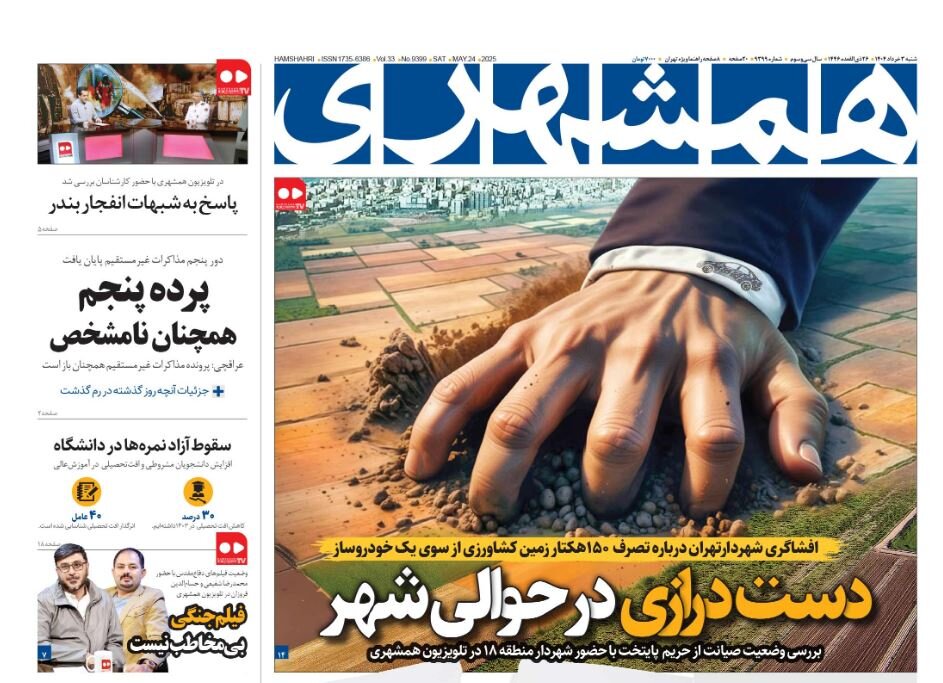In Tehran-Memo, the Hamshahri newspaper is working to negotiate the fifth round in Rome and hold a challenging and ambiguous situation.
It wrote: While the contradictory statements about Washington’s negotiations with Iran are not new issues, this approach has increased significantly on the day leading to a fifth-round speech, with the White House trying to put more pressure on Tehran with the tool “threatening and sacred.” The fifth round was pursued by both parties with a specific sensitivity. And despite the rise in rhetoric from the Washington-Tel-Aviv axis, Iranian officials at various political and military levels are ready to face different military and diplomatic scenarios. This is a situation in which the confusing approach of American officials and the threat of American and Zionists have led experts to raise serious questions about the White House’s willingness to reach a balanced agreement before the negotiations begin, evaluating the “abundance of zeros” ratings as an Iranian colony.
Etemad: America is in chaos
In an interview with retired diplomat Noslatra Tajik, Etemad discussed the turmoil of Americans in negotiations with Iran. He said: One possible reason for contradictory remarks by American officials is Washington’s confusion over policy against Iran. America seems to know what it doesn’t want, but still doesn’t know exactly what it wants. On the one hand, US officials have repeatedly emphasized that Iran’s peaceful nuclear program is not a problem, while on the other hand, these same officials argue that Iran should not be allowed to enrich uranium. It should not be forgotten that a recent statement from US authorities came shortly after Trump visited Riyadh. Some of these positions may be understood in the context of new regional coordination between the US and its allies. Many realistic analysts emphasized that the US president is not looking for war, but pursues maximum pressure. The use of various sticks, including the threat of Europe energizing snapback mechanisms or making provocative statements, could be part of a broader strategy to gain more concessions from Iran and achieve Washington’s goals.
Vatan-e-Emrooz: The Prisoner of Fantasy
Americans believe Iran is in a vulnerable position and can get more concessions from Iran than in 2015. Trump, Witkov and Rubio believe that by increasing pressure on Iran, they can gain more concessions from Tehran. Therefore, they believe that the threat of military action may cause Iran to retreat from its position. However, the revolutionary leaders warned and criticised the pointless remarks made by American officials, stressing that Iran would pursue nuclear rights based on its policies and its favorable approach. The first effect of the leader’s words is the collapse of the fantasy of Iran being in a vulnerable position. If Trump has the real will to reach an agreement with Iran, he must accept the facts about Iran’s nuclear program and the infrastructural red line of Iran. So these red lines are still in place for negotiations with the Trump administration. Trump must ultimately admit that he does not have the critical leverage to strip Iran of its nuclear rights. Neither the military threat nor the threat of a disruption of negotiations is a reliable threat to Iran.
Shargh: Roleplay in the midst of a big disagreement
European powers are threatening to trigger a snapback mechanism against Iran, holding diplomatic meetings with Iran. Arab countries also use sharing regional influence and security concerns, seeking to influence the course of negotiations between Iran and the US. Most of them share a common goal of preventing nuclear-armed Iran and a catastrophic war in the region. But Tehran’s “fundamental differences” between Iran and the US, particularly the “fundamental differences” regarding the enrichment issue, and its claim that it continues to enrich “with or without trade” makes it difficult for third parties to play a role. The success or failure of the fifth round consultation in Rome will have widespread results not only in Iran and the US, but also in the European and Arab worlds. The ability of these actors to use leverage constructively and provide solutions that can at least meet the interests of all parties can play an important role in preventing the complete failure of diplomacy and moving towards a deeper crisis. However, until Washington and Tehran deepen their common understanding of the underlying issues, the role of other actors will remain largely limited to crisis management and mitigation efforts.

